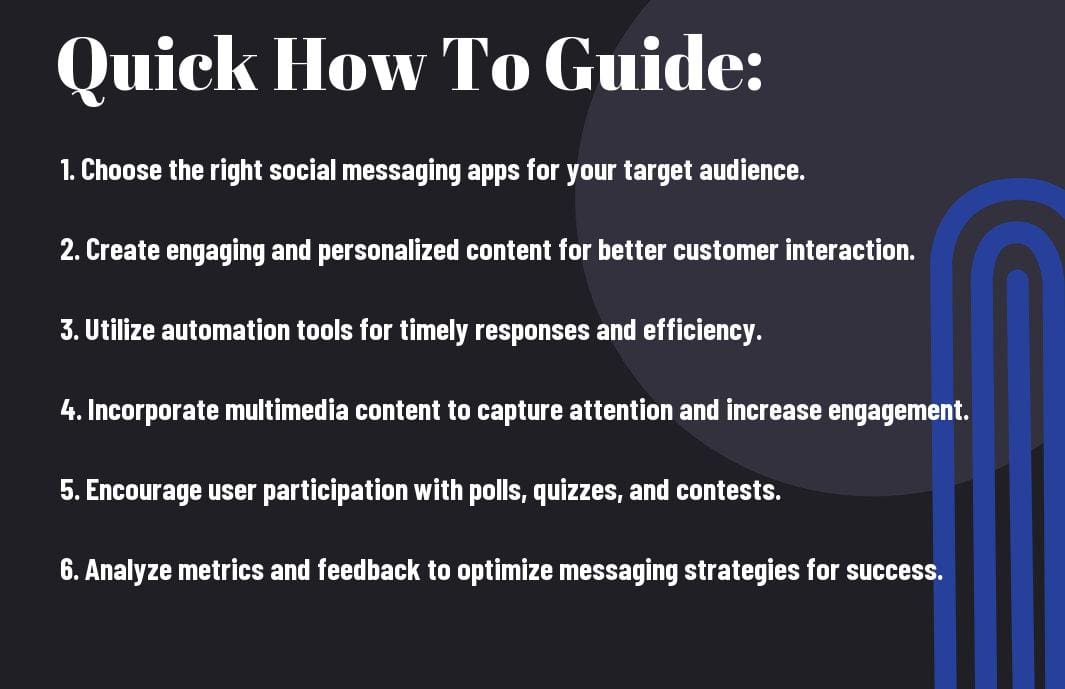Just stepping into the world of social messaging apps can be a game-changer for marketers looking to boost their reach and engagement. With over 5 billion monthly active users on messaging platforms, the potential for growth is substantial. This how-to guide will help marketers navigate the landscape of social messaging apps, from choosing the right platform to crafting engaging content that drives conversions. Stay ahead of the competition and harness the power of these highly personalized and interactive channels to take your marketing strategy to the next level.
Key Takeaways:
- Understanding your audience: It is crucial to know your target audience and their preferred social messaging apps to effectively engage with them.
- Personalization and automation: Utilize personalization features and automation tools within messaging apps to create personalized experiences for your customers at scale.
- Interactive content: Incorporate engaging content formats like polls, quizzes, and chatbots to drive user interaction and increase brand engagement on social messaging apps.

Getting Started with Social Messaging Apps
Choosing the Right Platform for Your Audience
While there are numerous social messaging apps available, it is important to choose the right platform for your audience. Consider factors such as demographics, user behavior, and features offered by different apps. Analyze where your target audience spends most of their time and which platforms align best with your marketing objectives. Whether it’s WhatsApp, Facebook Messenger, WeChat, or another app, make sure to select the one that will most effectively reach and engage your audience.
Setting Up Your Business Account
If you want to effectively utilize social messaging apps for marketing, setting up a business account is crucial. Ensure that your business profile is complete with accurate information, including contact details, website links, and a compelling description of your products or services. Verify your account if the platform offers this feature to add credibility to your business. Utilize any additional features provided for businesses, such as chatbots or automated responses, to enhance customer experience and streamline communication.
Strategies for Engagement
Personalizing Communication with Users
After establishing a presence on social messaging apps, it is crucial for marketers to personalize their communication with users. This personal touch can set a brand apart and foster a stronger connection with the audience. Addressing customers by their names, sending personalized offers based on their preferences, and engaging in one-on-one conversations are some effective ways to personalize communication and enhance user engagement.
Crafting Effective Messages
Some marketers underestimate the power of crafting effective messages on social messaging apps. Crafting messages that resonate with the target audience, are concise and engaging, and include a clear call-to-action can significantly impact the success of a marketing campaign. It is imperative to understand the platform’s unique features and limitations to tailor messages that are memorable, actionable, and relevant to the users.

Advanced How-To Tips
All marketers looking to elevate their social messaging game should consider implementing these advanced tips:
- Automating Conversations with Chatbots
- Integrating Apps with Your Marketing Strategy
Automating Conversations with Chatbots
Conversations with customers in social messaging apps can be automated using chatbots. These AI-powered tools can handle frequently asked questions, provide personalized recommendations, and even assist in completing transactions. By setting up chatbots strategically, businesses can streamline customer interactions, provide 24/7 support, and improve overall user experience.
Integrating Apps with Your Marketing Strategy
Little touches can make a big difference in how you integrate social messaging apps with your overall marketing strategy. By incorporating these apps seamlessly into your existing campaigns and customer touchpoints, you can create a cohesive omnichannel experience that drives engagement and conversions. From sharing exclusive offers to providing instant customer support, the possibilities are endless for marketers who leverage the power of social messaging apps effectively.
Measuring Success
Essential Metrics and KPIs to Track
Keep a close eye on key performance indicators (KPIs) such as engagement rate, conversion rate, click-through rate, and customer acquisition cost. These metrics will help you gauge the effectiveness of your social messaging campaigns and make data-driven decisions to optimize your strategy.
Factors for Analyzing Campaign Effectiveness
While launching social messaging campaigns, consider factors like target audience demographics, campaign reach, conversion tracking, and A/B testing results. By analyzing these factors, you can determine the impact of your campaigns and make necessary adjustments for better results.
- Target audience demographics play a crucial role in campaign success.
- Monitoring campaign reach helps in evaluating the overall performance.
- A/B testing provides valuable insights for optimizing future campaigns.
Effectiveness
One imperative aspect of measuring campaign effectiveness is conversion tracking. This allows you to attribute conversions to specific campaigns and channels accurately. By recognizing the sources that drive the most conversions, you can allocate your resources effectively for maximum impact.
- Conversion tracking helps in understanding the ROI of your campaigns.
- Attributing conversions to the right sources can improve campaign optimization.
- Recognizing the most effective channels can guide future marketing strategies.
Overcoming Common Challenges
Tips for Handling Negative Feedback
Once again, when facing negative feedback on social messaging apps, it’s imperative to handle the situation with care and professionalism. Listen to the concerns raised by the users and acknowledge their feedback promptly. Address their issues openly and transparently, and offer solutions where possible. Always maintain a positive and respectful tone in your responses to show that you value your customers’ opinions.
- Listen to the feedback
- Acknowledge the concerns
- Address the issues openly
- Maintain a positive tone
- Assume that every complaint is an opportunity to improve.
Managing High Volume Messaging Efficiently
High volume messaging can be overwhelming for marketers, but with the right strategies in place, it can be managed efficiently. High volume messaging requires automation tools to help handle the influx of messages without compromising on quality. Utilize chatbots and automated responses to streamline the communication process and provide quick solutions to common queries. Additionally, monitor the conversations closely to ensure that all messages are being addressed in a timely manner.
Tips: Use automation tools for efficiency, chatbots can help with common queries, monitor conversations closely for timely responses.
Summing up
With this in mind, social messaging apps present a powerful opportunity for marketers to engage with their audiences on a more personal level. By following the strategies outlined in this guide, businesses can leverage these platforms to drive brand awareness, nurture customer relationships, and ultimately drive sales. Understanding the unique features and user behaviors of each app, tailoring content to fit each platform, and utilizing analytics to track success are all key components to a successful social messaging app marketing strategy. By implementing these tactics, marketers can stay ahead of the curve and connect with consumers where they are already spending a significant amount of their time online.
FAQ
Q: What are social messaging apps for marketers?
A: Social messaging apps are platforms that enable users to send messages, share multimedia content, and engage in real-time communication. They provide marketers with a direct channel to reach and engage with their target audience.
Q: How can marketers use social messaging apps effectively?
A: Marketers can leverage social messaging apps by creating compelling and personalized content, engaging with customers in real-time, providing customer support, running targeted advertising campaigns, and building relationships with their audience.
Q: What are some successful strategies for marketers using social messaging apps?
A: Some successful strategies for marketers using social messaging apps include creating chatbots to automate customer interactions, providing exclusive content and offers to users, using interactive features like polls and quizzes to engage with the audience, and measuring and analyzing performance metrics to optimize campaigns.




